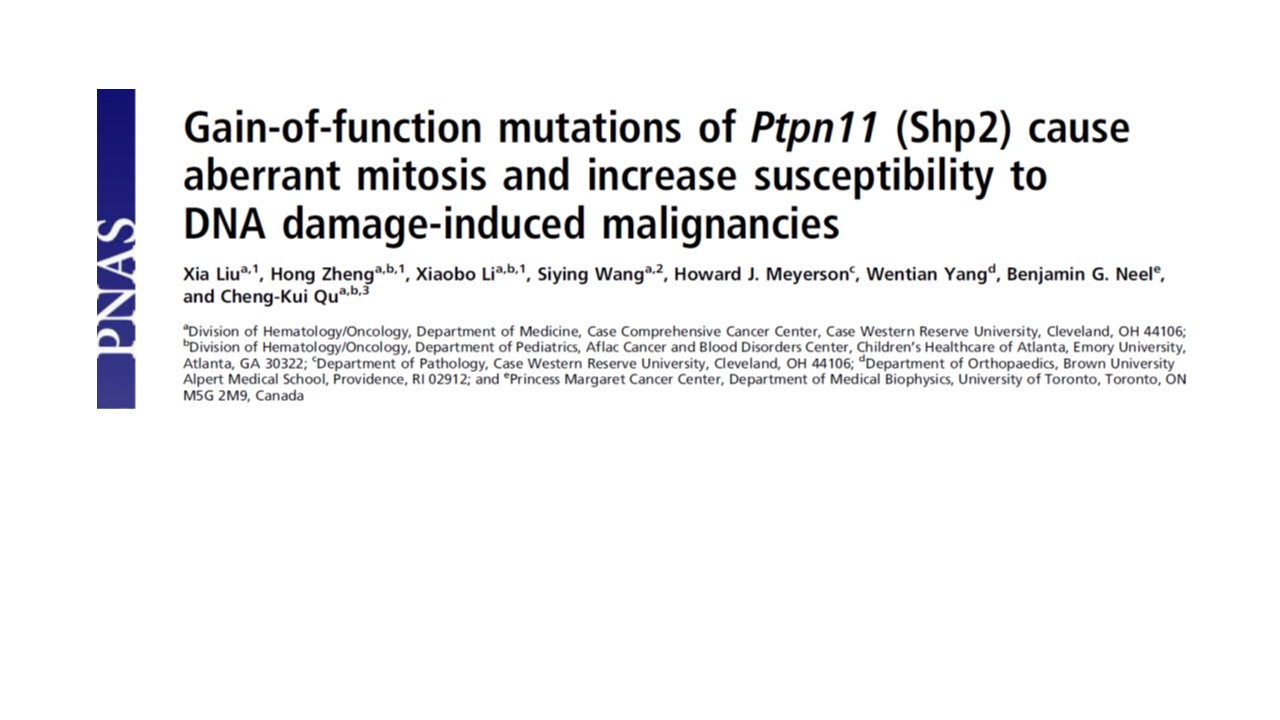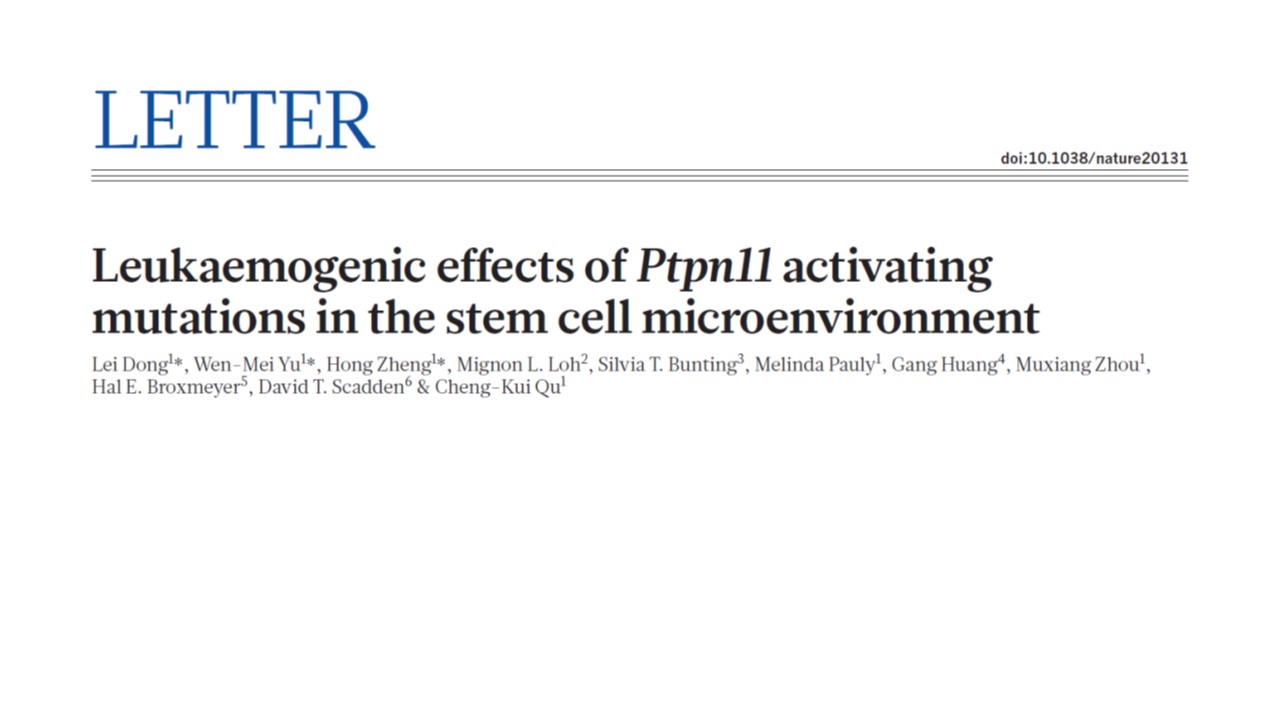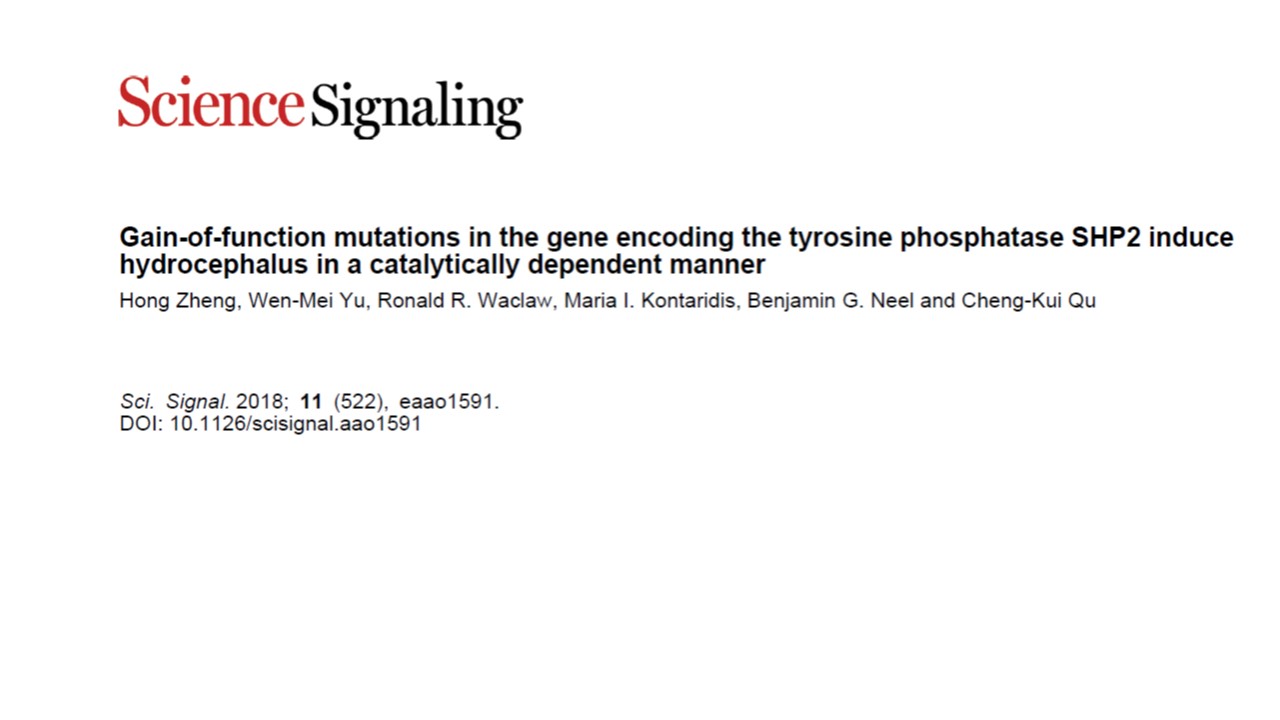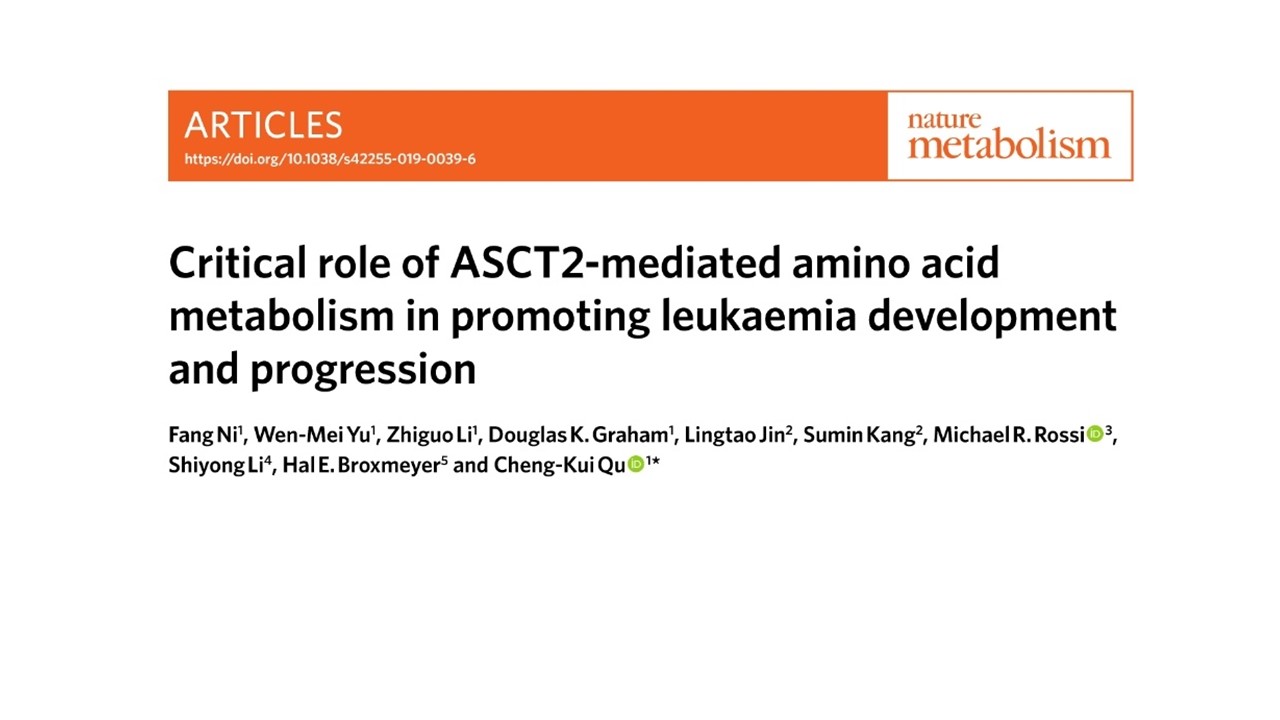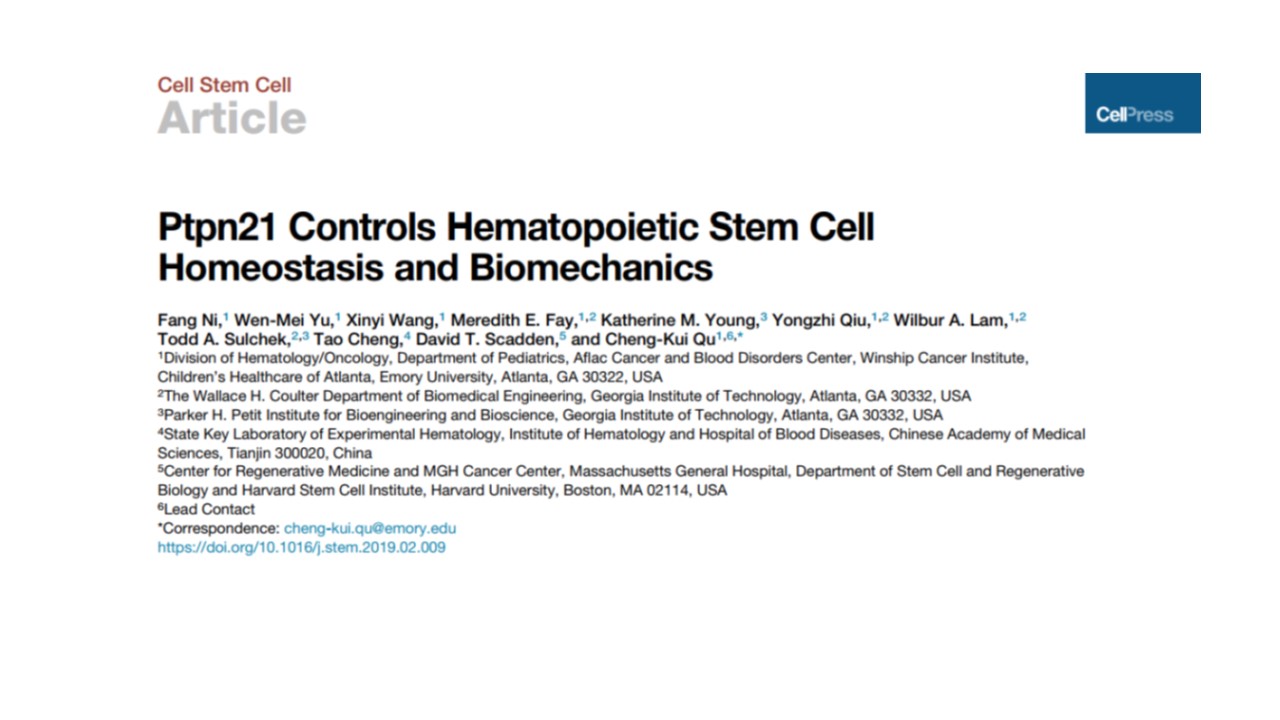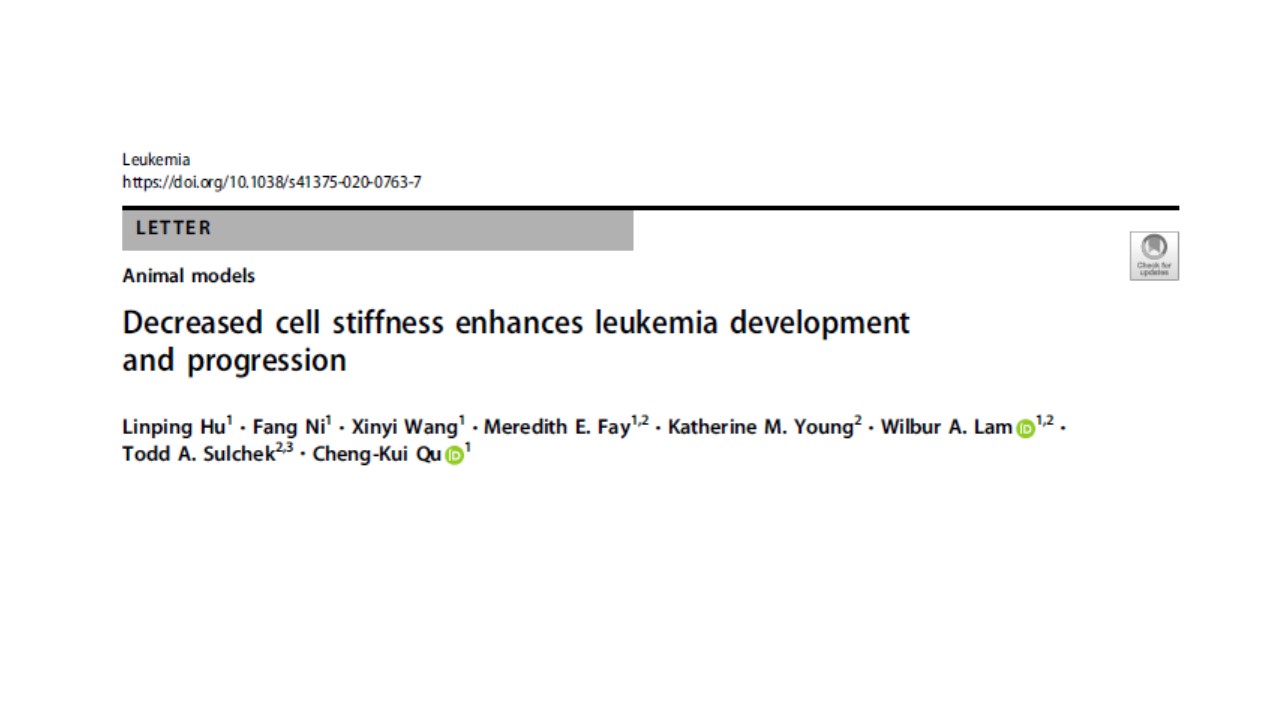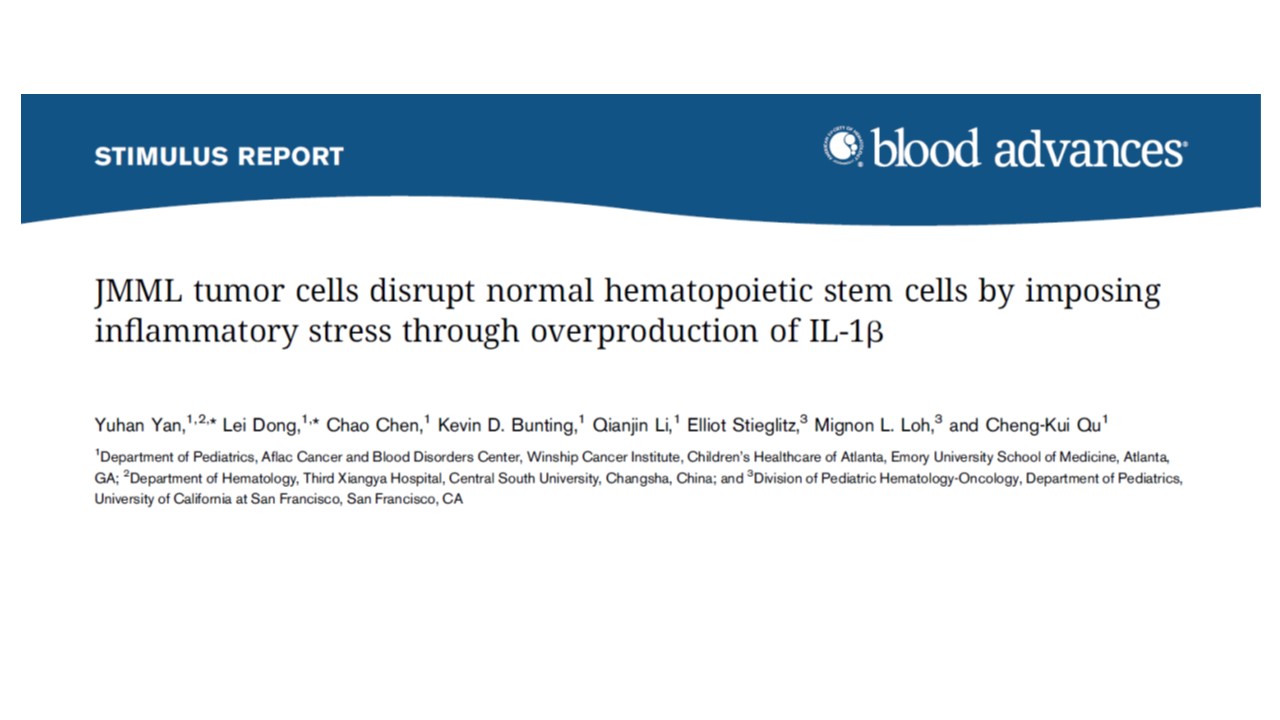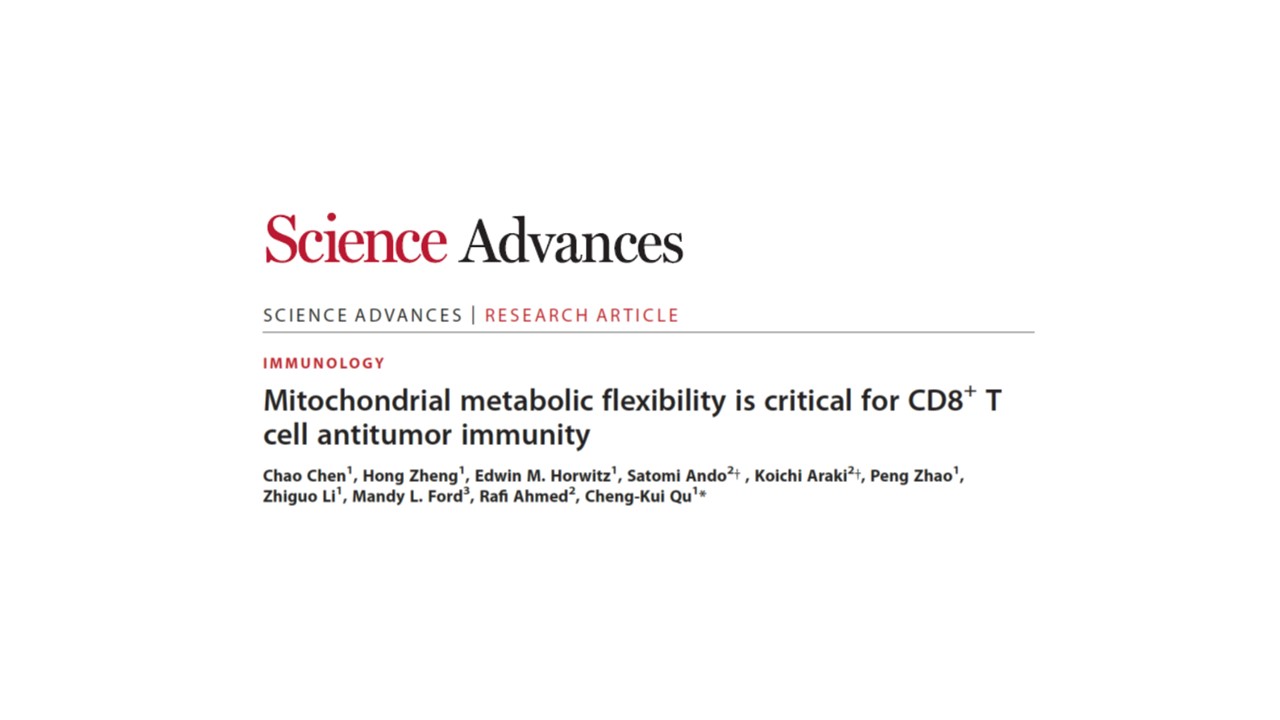Research Overview
Exploration of cell signaling, metabolic, and biomechanical control in both normal and malignant hematopoietic cell development is a primary focus in our research laboratory. Our specific emphasis lies in investigating the role of protein and lipid phosphatases within normal hematopoietic stem cells and leukemic stem cells. Through the examination of these phosphatases, our goal is to uncover the molecular mechanisms crucial for normal hematopoiesis and understand how their aberrant regulation is linked to hematological malignancies. Furthermore, the insights gained from these studies contribute to the development of innovative strategies and therapeutics, aiming to enhance stem cell-based therapy and improve the treatment of related leukemias.
- Cellular and molecular mechanisms by which activating mutations of PTPN11 induce leukemia
- Development of novel therapeutics for the leukema caused by PTPN11 mutations
- Metabolic regulation of hematopoietic stem cells, leukemic stem cells, and CD8 T cells
- Biomechanical regulation of hematopoietic stem cells and CD8 T cells
POST-DOCTORAL POSITION
Job Description:
To investigate the molecular mechanisms by which genetic mutations of protein tyrosine phosphatase PTPN11 (SHP2) induce childhood leukemias, and to use this knowledge to develop novel therapeutics for these diseases. Research in our laboratory is centered on the signaling and metabolic mechanisms involved in normal and malignant hematopoiesis. We are particularly interested in the regulation by protein and lipid phosphatases, including PTPN11, in hematopoietic stem cell biology and in leukemogenesis. A variety of experimental approaches, such as mouse genetics, biochemical, and stem cell technologies are undertaken in these studies.
Qualifications:
Candidates should have a PhD degree with a strong background in molecular biology and cell biology. Previous experience in cell signaling and experimental hematology is preferable.
Contact:
Interested individuals should send their curriculum vitae and the names and addresses of three references to cheng-kui.qu@emory.edu.
Chao Chen, Assistant Scientist
Peng Zhao, Assistant Scientist
Haizi Cheng, Postdoctoral Fellow
Daniel Zhang, Undergraduate Student
Angela Chen, Undergraduate Student
Carly Harris, Undergraduate Student
Wen-Mei Yu, Lab Manager
Chen C., H. Zheng, S. Ando, K. Araki, P. Zhao, Z. Li, M. L. Ford, R. Ahmed, and C. K. Qu. Mitochondrial metabolic flexibility is critical for CD8 T cell anti-tumor immunity. Science Advances. 2023; 9(49): eadf9522.
Zheng H., Q. Li, S. Li, Z. Li, M. Brotto, D. Weiss, D. Prosdocimo, C. Xu, A. Reddy, M. Puchowicz, C. Croniger, X. Zhao, M. N. Weitzmann, M. K. Jain, and C. K. Qu. Loss of PTPMT1 limits mitochondrial utilization of carbohydrates and leads to muscle atrophy and heart failure in tissue specific knockout mice. eLife. 2023; 12:RP86944.
Zhang R., D. Chen, H. Fan, R. Wu, J. Tu, F. Zhang, M. Wang, H. Zheng, C. K. Qu, S. E. Elf, B. Faubert, Y. Y. He, M. B. Bissonnette, X. Gao, R. J. DeBerardinis, and J. Chen. Cellular signals converge at the NOX2-SHP-2 axis to induce reductive carboxylation. Cell Chemical Biology. 2022; 29:1-9.
Yan Y., L. Dong, J. Zhang, K. D. Bunting, E. Stieglitz, M. L. Loh, and C. K. Qu. JMML tumor cells suppress normal hematopoiesis by disrupting hematopoietic stem cell homeostasis through overproduction of IL-1β. Blood Advances. 2021. 6:200-206
Su H., M. Jiang, C. Senevirathne, S. Alri, T. Zhang, J. X. Ferrucio, N. T. Tran, S. M. Liu, G. Han, S. Jin, Y. Zhu, Q. Zhao, Y. Chen, S. Winski, Y. Shen, J. Liu, C. K. Qu, C. Klug, R. Bhatia, Y. Chen, S. Nimer, Y. G. Zheng, J. Jin, H. Deng, D. S. Krause, J. Xiang, A. Verma, M. Luo, X. Zhao. Arginine Methylation of Dual Specificity Phosphatase 4 Controls Cell Differentiation. Cell Reports. 2021; Jul 27;36(4):109421
Hu L., F. Ni, X. Wang, M. E. Fay, K. M. Young, W. A. Lam, T. A. Sulchek, and C. K. Qu. Decreased cell stiffness enhances leukemia development and progression. Leukemia. 2020, Feb 24. doi: 10.1038/s41375-020-0763-7
Ni F., W. M. Yu, X. Wang, M. E. Fay, K. Young, Y. Qiu, W. A. Lam, T. A. Sulchek, T. Cheng, D. T. Scadden, and C. K. Qu. Ptpn21 controls hematopoietic stem cell homeostasis and biomechanics. Cell Stem Cell. 2019; 24:1-13.
Featured in: Emory News Release, MedicalXpress, Business Standard , Science Daily
Ni F., W. M. Yu, Z. Li, D. K. Graham, L. Jin, S. Kang, M. R. Rossi, S. Li, H. E. Broxmeyer, and C. K. Qu. Critical role of ASCT2-mediated amino acid metabolism in promoting leukemia development and progression. Nature Metabolism. 2019; 1:390-403.
Featured in News & Views in Nature Metabolism (2019; 1:308–309), Emory News Release, Science Daily, MedicalXpress, EurekAlert
Hayashi Y., Y. Zhang, A. Yokota, X. Yan, J. Liu, K. Choi, B. Li, G. Sashida, Y. Peng, Z. Xu, R. Huang, L. Zhang, G. M. Freudiger, J. Wang, Y. Dong, Y. Zhou, J. Wang, L. Wu, J. Bu, A. Chen, X. Zhao, X. Sun, K. Chetal, A. Olsson, M. Watanabe, L. E. Romick-Rosendale, H. Harada, L. Y. Shih, W. Tse, J. P. Bridges, M. A. Caligiuri, T. Huang, Y. Zheng, D. P. Witte, Q. F. Wang, C. K. Qu, N. Salomonis, H. L. Grimes, S. D. Nimer, Z. Xiao, and G. Huang. Pathobiologic Pseudohypoxia as a Putative Mechanism Underlying Myelodysplastic Syndromes. Cancer Discovery. 2018; 8:1438-1457
Jin L., J. Chun, C. Pan, A. Kumar, G. Zhang, Y. Ha, D. Li, G. N. Alesi, Y. Kang, L. Zhou, W. M. Yu, K. R. Magliocca, F. R. Khuri, C. K. Qu, C. Metallo, T. K. Owonikoko, and S. Kang. The PLAG1-GDH1 axis promotes anoikis resistance and tumor metastasis through CamKK2-AMPK signaling in LKB1-deficient lung cancer. Molecular Cell. 2018; 69:87-99
Zheng H., W. M. Yu, J. Shen, S. Kang, D. Hambardzumyan, J. Y. Li, Y. Shen, A. M. Kenney, J. Chen, and C. K. Qu. Mitochondrial oxidation of the carbohydrate fuel is required for neural precursor/stem cell function and postnatal cerebellar development. Science Advances. 2018; 4: eaat2681.
Featured in: Emory News Release, Science Daily, EurekAlert, Biocompare News
Stavrou E. X., C. Fang, K. L. Bane, E. Kucukal, L. V. Nayak, A. Merkulova, S. Izadmehr, M. M. Mumaw, C. C. Reynolds, O. Alhalabi, W. M. Yu, C. K. Qu, U. A. Gurkan, H. J. Meyerson, M. T. Nieman, A. H. Schmaier. Factor XII - uPAR Upregulate Neutrophil Functions to Influence Wound Healing. The Journal of Clinical Investigation. 2018; 128:944-959
Jin L., J. Chun, C. Pan, D. Li, R. Lin, G. N. Alesi, X. Wang, H. B. Kang, L. Song, D. Wang, G. Zhang, J. Fan, T. J. Boggon, L. Zhou, J. Kowalski, C. K. Qu, C. E. Steuer, G. Z. Chen, N. F. Saba, L. H. Boise, T. K. Owonikoko, F. R. Khuri, K. R. Magliocca, D. M. Shin, S. Lonial, and S. Kang. MAST1 drives cisplatin resistance in human cancers by rewiring cRaf independent MEK activation. Cancer Cell. 2018; 34(2):315-330
Zheng H., W. M. Yu, R. R. Waclaw, M. I. Kontaridis, B. G. Neel, and C. K. Qu. Gain-of-function mutations in protein tyrosine phosphatase Ptpn11 (Shp2) induce hydrocephalus in a catalytically-dependent manner. Science Signaling. 2018; 11 (522), eaao1591.
Featured in: Emory News Release, MedicalXpress, Science and Technology Research News
Dong L., H. Zheng, and C. K. Qu. CCL3 is a key mediator for the leukemogenic effect of Ptpn11 activating mutations in the stem cell microenvironment. Blood. 2017; 130:1471-1474
Liu W., W. M. Yu, J. Zhang, R. J. Chan, M. L. Loh, Z. Zhang, K.D. Bunting, and C. K. Qu. Inhibition of the Gab2/PI3K/mTOR signaling ameliorates the myeloid malignancy caused by Ptpn11 (Shp2) gain-of-function mutations. Leukemia. 2017; 31:1415-1422
Dong, L., W.M. Yu, H. Zheng, M. L. Loh, S. T. Bunting, M. Pauly, G. Huang, M. Zhou, H. E. Broxmeyer, D. T. Scadden, and C. K. Qu. Leukemogenic effects of Ptpn11 (Shp2) activating mutations in the stem cell microenvironment. Nature. 2016; 539:304-308.
Featured in: News and Views in Nature [2016;539(7628):173-175], Research Watch in Cancer Discovery (2016; 6:1302-1302), Emory News Release, CHOA News Release, Science Daily, Stem Cell Portal
Gu L., H. Zhang, T. Liu, S. Zhou, Y. Du, J. Xiong, S. Yi, C. K. Qu, H. Fu, and M. Zhou. Discovery of dual inhibitors of MDM2 and XIAP for cancer treatment. Cancer Cell. 2016; 30: 623-636
Liu, X., H. Zheng, X. Li, S. Y. Wang, H. J. Meyerson, W. Yang, B. G. Neel, and C. K. Qu. Gain-of-function mutations of Ptpn11 (Shp2) cause aberrant mitosis and increase susceptibility to DNA damage-induced malignancies. Proceedings of the National Academy of Sciences of the United States of America. 2016; 113:984-989
Liu, X., H. Zheng, T. M. W. M., Yu, Cooper, K. D. Bunting, and C. K. Qu. Maintenance of hematopoietic stem cells ex vivo by reprograming cellular metabolism. Blood. 2015; 125:1562-1565
Recommended as being of special significance in its field by Faculty of 1000
Yu, W. M., X. Liu, J. Shen, J. Jovanovic, E. E. Pohl, S. L. Gerson, T. Finkel, H. E. Broxmeyer, and C. K. Qu. Metabolic regulation by the mitochondrial phosphatase PTPMT1 is required for hematopoietic stem cell differentiation. Cell Stem Cell. 2013; 12:62-74.
Liu, X., H. Zheng, and C. K. Qu. Protein tyrosine phosphatase Shp2 (Ptpn11) plays an important role in maintenance of chromosome stability. Cancer Research. 2012; 72:5296-5306
Xu, D., X. Liu, W. M. Yu, H. Meyerson, C. Guo, S. L. Gerson, and C. K. Qu. Non-lineage/stage restricted effects of a gain-of-function mutation in tyrosine phosphatase Ptpn11 (Shp2) on leukemia stem cell development. The Journal of Experimental Medicine. 2011; 208:1977-1988
Xu, D., S. Wang, W. M. Yu, Chan, T. Araki, K. D. Bunting, B. G. Neel, and C. K. Qu. A germline gain-of-function mutation in Ptpn11 (Shp2) phosphatase induces myeloproliferative disease by aberrant activation of hematopoietic stem cells. Blood. 2010; 116:3611-3621
Shen, J., W. M. Yu, M. Brotto, J. A. Scherman, C. Guo, C. Stoddard, T. M. Nosek, H. H. Valdivia, and C. K. Qu. Deficiency of phosphatidylinositol phosphate phosphatase MIP/MTMR14 induces a muscle disorder by disrupting Ca2+ homeostasis. Nature Cell Biology. 2009; 11:769-776.
Featured in: Press Release for Nature and Nature research journals, May 24, 2009 (http://www.nature.com/ncb/press_release/ncb0509.html)


